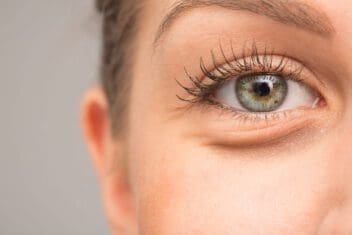Puffy Eyes: How to Rid of Bags Under Your Eyes
Home / Eye Health and Preventive Care /
Last Updated:
Table of Contents
Fluid can get retained under the eyes, leading to puffy eyes. Sagging skin can also cause the appearance of bags under your eyes.
This can be due to several reasons, including allergies, not getting enough sleep, diet, genetics, trauma, aging, or a medical condition. If you know the cause of your puffy eyes, it can help to remedy them.
You can minimize swelling and the appearance of dark circles under your eyes by using a cool compress and trying a few other home remedies. Lifestyle changes, such as addressing sleep issues and modifying your diet, can have an impact as well.
Allergies and medical conditions can require medications. There are also noninvasive cosmetic treatments and surgical options for getting rid of the bags under your eyes.
Causes of Puffy Eyes & Undereye Bags
The natural aging process is the most common cause for bags under the eyes. As we age, skin tone and muscles lose some of their firmness, which can cause loose skin and the appearance of undereye bags. The fat tissue under the eyes can then bulge through, causing puffiness.

These are additional common causes of puffy eyes and bags under the eyes:
You deserve clear vision. We can help.
With 135+ locations and over 2.5 million procedures performed, our board-certified eye surgeons deliver results you can trust. Your journey to better vision starts here.
- Allergies: Seasonal allergies or allergic reactions can cause eye irritation and a buildup of fluid around the eyes.
- Genetics: Puffy eyes and dark circles under the eyes can be hereditary and run in families.
- Sleep issues: Not getting enough sleep can lead to dark circles under your eyes, swelling, and drooping eyelids.
- Diet: Eating a diet with a lot of salt can cause fluid retention.
- Accident or injury: Trauma to the face or eye can cause swelling and puffy eyes.
- Medical condition: There are several conditions that can impact the tissue around your eyes, leading to bags under the eyes and puffy eyes. These conditions include infections, cancer, kidney failure, blepharitis (inflammation of the lining of the eyelids), and uveitis (eye inflammation).
Understanding the cause of your puffy eyes can help when looking for a way to manage or treat them. Usually, bags under the eyes and puffy eyes are not cause for concern and do not need specialized treatment. However, they can make you feel less attractive and be bothersome. Many people want to treat them for the associated boost in self-confidence they feel from the results.
Home Remedies for Bags Under the Eyes
There are a few things you can do yourself at home to decrease puffy eyes and undereye bags.
Use a cool compress.
While sitting upright, gently press a damp, cool washcloth to your eyes for a few minutes. This can reduce swelling.
Quit smoking.
Smoking can thin the skin under your eyes and contribute to more rapid collagen loss.
Raise your head during sleep.
Propping the head of your bed up a few inches or adding an extra pillow can elevate your head. This can help to keep fluid from settling around your eyes while you are asleep.
Use a chilled tea bag.
Placing caffeinated black tea bags on your closed eyes for a few minutes can help to reduce puffiness. Caffeine works to constrict blood vessels, which can reduce swelling.
Apply makeup.
Cosmetic products like concealer can help to mask the appearance of shadows and bags under the eyes. Eye cream, applied at night, can often help to reduce puffy eyes when used on a consistent basis.
Lifestyle Changes That Can Help

Puffy eyes are frequently the result of sleep issues, allergies, and diet. Therefore, they can be managed with some simple lifestyle changes.
If you suffer from seasonal or environmental allergies, take allergy medication, limit your contact to irritants and triggers, and find other ways to manage your allergy symptoms. These approaches can help to lessen the bags and swelling under your eyes.
Try not to drink a lot of fluids before bed, as this can contribute to fluid retention during sleep and puffy eyes when you wake up. Be sure to get enough sleep. The recommended amount is between seven and nine hours per night for adults. This can greatly impact the appearance of dark circles, puffy eyes, and undereye bags.
A factor that is often overlooked when dealing with puffy eyes is diet. What you eat can impact not only your overall health but also the appearance of puffy eyes. For example, a diet high in sodium causes your body to retain fluid, which can inflate the tissue under your eyes, making it appear puffy and saggy.
The daily recommended value of sodium in your diet should be less than 2,300 mg per day, which is smaller than a teaspoon of salt. Sodium can hide in all sorts of food and drinks, especially processed ones.
Here are some tips for adjusting your diet to reduce puffy eye symptoms:
- Be aware of what is in the food you eat.
- Read all labels.
- Eat as little processed and refined food as possible.
- Watch your sodium intake closely.
You deserve clear vision. We can help.
With 135+ locations and over 2.5 million procedures performed, our board-certified eye surgeons deliver results you can trust. Your journey to better vision starts here.
Medications
When puffy eyes are the result of a medical condition, medications to treat the condition can also help to manage the symptoms of puffy eyes. For example, antihistamines and allergy medications to control allergies can also reduce puffy eyes.
If puffy eyes are causing eye irritation and impacting vision, an eye or physical exam can help to identify the cause of your swelling and determine a course of treatment, if necessary.
Certain products that are used on the face can cause irritation and swelling, as can irritants and exposure to chemicals. Share information about all the products you use with your doctor.
Cosmetic Treatments & Surgery

Noninvasive cosmetic procedures, such as fillers, chemical peels, and laser resurfacing, are skin therapies that can tighten the skin under your eyes and reduce the appearance of bags. These often require multiple treatment sessions and may need to be combined to completely eliminate the bags under your eyes.
There is also a surgical option to remove excess fat and skin from under the eyes called a blepharoplasty. This procedure is generally only considered after other methods have failed.
Fillers
A filler jelly-like material is injected under the eye to smooth it out. Results typically last about six months to a year.
Chemical peels
A chemical solution is applied to the skin under the eyes to remove the top layers. This can reveal the brighter and tighter skin underneath. Results can last for a few years.
Laser resurfacing
A laser is used to remove the surface layers of the skin, much like a chemical peel. Results can last several years, depending on your skin type and exposure to the sun.
Blepharoplasty
This is a lower eyelid lift. It involves tightening up the skin and muscle, and manipulating the fat tissue to smooth out features and eliminate bags under the eyes.
Puffy eyes and bags under the eyes can be an annoyance, but they can be minimized, treated, and even eliminated through a variety of options.
You deserve clear vision. We can help.
With 135+ locations and over 2.5 million procedures performed, our board-certified eye surgeons deliver results you can trust. Your journey to better vision starts here.
References
- How to Get Rid of Bags Under Your Eyes. (2021). Johns Hopkins University.
- Bags Under the Eyes. (November 2018). American Optometric Association (AOA).
- Blepharitis. American Optometric Association (AOA).
- Uveitis. (July 2019). National Eye Institute (NEI).
- National Sleep Foundation’s Sleep Time Durations and Recommendations: Methodology and Results Summary. (March 2015). Sleep Health.
This content is for informational purposes only. It may have been reviewed by a licensed physician, but is not intended to serve as a substitute for professional medical advice. Always consult your healthcare provider with any health concerns. For more, read our Privacy Policy and Editorial Policy.